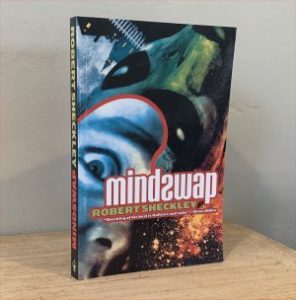Robert Sheckley was a science fiction writer who debuted in the early 1950s, right about the time Philip K. Dick that did. They were both prolific short story writers through the ’50s, each publishing several stories a year, in the various magazines of the time, year after year.
Sheckley was not as prolific a novelist as PKD, though; the one here was just his fourth published novel, in 1966, by which time PKD had published 20. Sheckley kept producing, steadily, for decades, but never reached the stature of PKD, nor did his later works impress as well-known as his early ones.
Sheckley was a humorist and absurdist with sometimes perverse takes on standard science fiction themes. Mindswap has quite a few cute ideas, and some subversive ones, but is structurally haphazard, as if the author made it up as he went along, aiming for a conclusion he already had in mind but otherwise marking time until he got there.
Gist:
- In some intermediate future, Marvin Flynn, 31 years old, is bored with his life (he weekends in Europe “like everyone else,” has spent 12 years in college), and decides to answer an ad for a “mindswap,” a procedure in which he exchanges his mind with that of a Martian. They will each take over the other’s body for a period of time.
- The Swap is performed, and Marvin finds himself on Mars, and in trouble. There’s been a mixpup, he’s told; another Martian claims fraud about whose body was swapped.
- Marvin finds a lawyer, who doesn’t help much, and deals with a shady operator who finds him a job — via another swap — as an egg collector on Melden, in a rain forest.
- He meets a Ganzer, whose eggs he is supposed to collect, and learns the Ganzer is a also a Swapper, from Earth.
- In a series of episodes he then becomes a wealthy man on Celsus V, undergoes “metaphoric deformation” in an old west landscape, falls in love with a girl, becomes some kind of swordsman, and ends up in a “Twisted World,” until he finds himself back home on Earth.
Good Bits:
- The lawyer, Urf Urdorf, admits that he’s lost his past 158 cases, but argues that this means he’s due to win the next one. This is in fact a classic error of reasoning — the gambler’s fallacy, I think it’s called — like the notion that tossing four, or fourteen, heads in a row *must* mean the next toss will be tails. Actually each toss is an independent event, unaffected by the others; that’s why it’s a fallacy. Of course we might guess there’s some common element of Urdorf himself that affects all of his cases, which would in fact undermine his claim.
- A hermit on Melden speaks only in verse, and only while outside. Why? Because that’s how it works (by not trying to prove the claim wrong). “All of us live by the employment of countless untested assumptions, and truth of falsehood of which we can determine only through the hazard of our lives. Since most of us value our lives more than the truth, we leave such drastic tests for the fanatics.” Like not bothering to try to walk on water.
- Similarly bizarre reasoning comes in the Old West scenes, in which a guide explains his “Theory of Searches”, which “forces upon us the immediate conclusion that nothing can be truly (or ideally) lost. Consider: for a thing to be lost, it would require a place to be lost in. But no such place can be found, since simple multiplicity carries no implication of qualitative differentiation.” And so on; further, unrelated but equally roundabout explanations are offered in subsequent pages.
- And finally, Marvin returns hometown Stanhope, after passing through the “Twisted World.” Everything looks OK: “Nothing seemed to be amiss. Life went on as usual; his father tended his herds of rats, and his mother placidly continued to lay eggs.” … “He lay beneath Stanhope’s familiar green sky and considered this possibility. It seemed unlikely: for did not the giant oak trees still migrate each year to the south? Did not the huge red sun move across the sky, pursued by its dark companion? Did not the triple moons return each month with their new accumulations of comets?”
And
- Concerning that lawyer: “…if justice really existed, there would be no need for law and lawmakers, and thus one of mankind’s noblest conceptions would be obliterated, and an entire occupational group would be thrown out of work….
- Self-reflection: “The room lacked only a bulky solid-state Moraeny to make it a perfect replica of a scene from the pages of Sheckley or one of the other early poets of the Age of Transmission.”
- Typical playful doubletalk, “He found the Celsian body a good fit, with a high aspect of jointure and an excellent main-sequence random-disperson pattern. There were problems, of course: the delta curve was absurdly elliptic, and the UYP’s (universal Y points) were falciform rather than trapezoidal. But you had to expect that on a Type 3B planet…”
Lots of cute stuff. To be fair, Sheckley invokes the ideas of “metaphoric deformation,” the risks of perception (Panzaism), and the “Twisted World” early on, before invoking them in later scenes. And the final scenes are a classic science fiction twist, in which a traveler in time (or Twisted Space) returns home and finds it utterly changed–whether or not the traveler realizes it.
If only the narrative were less episodic and made more, you know, narrative sense.






